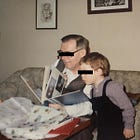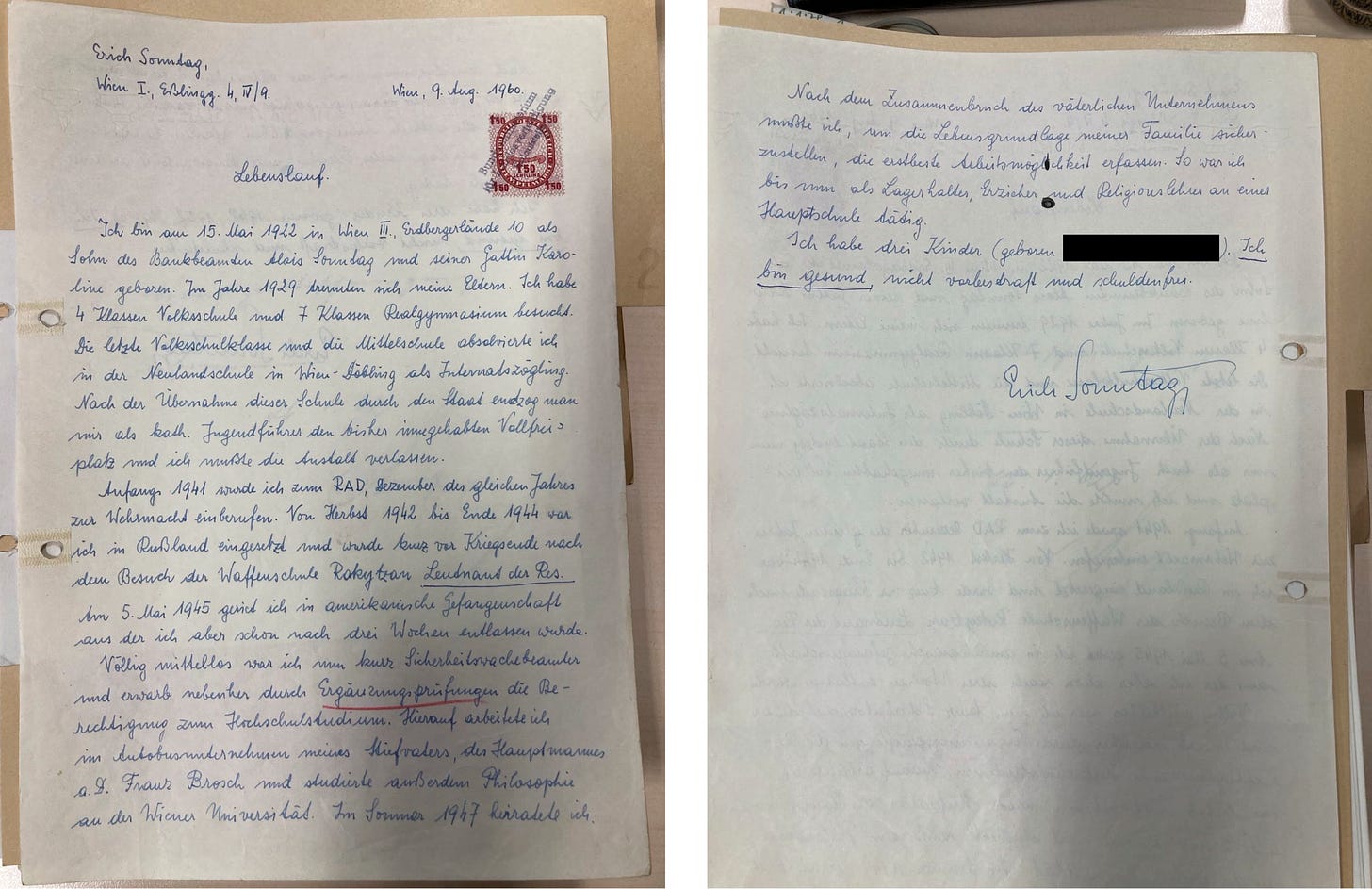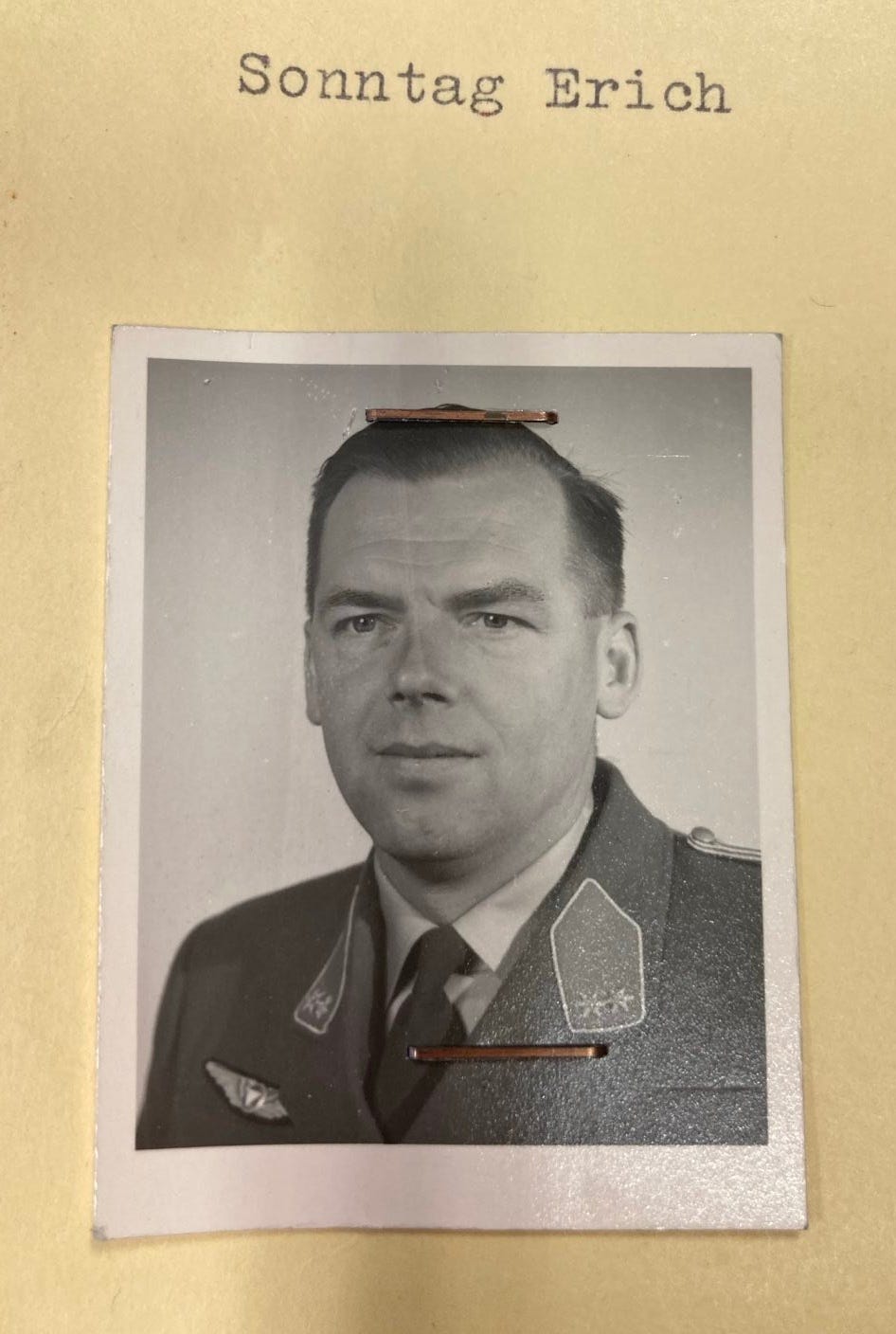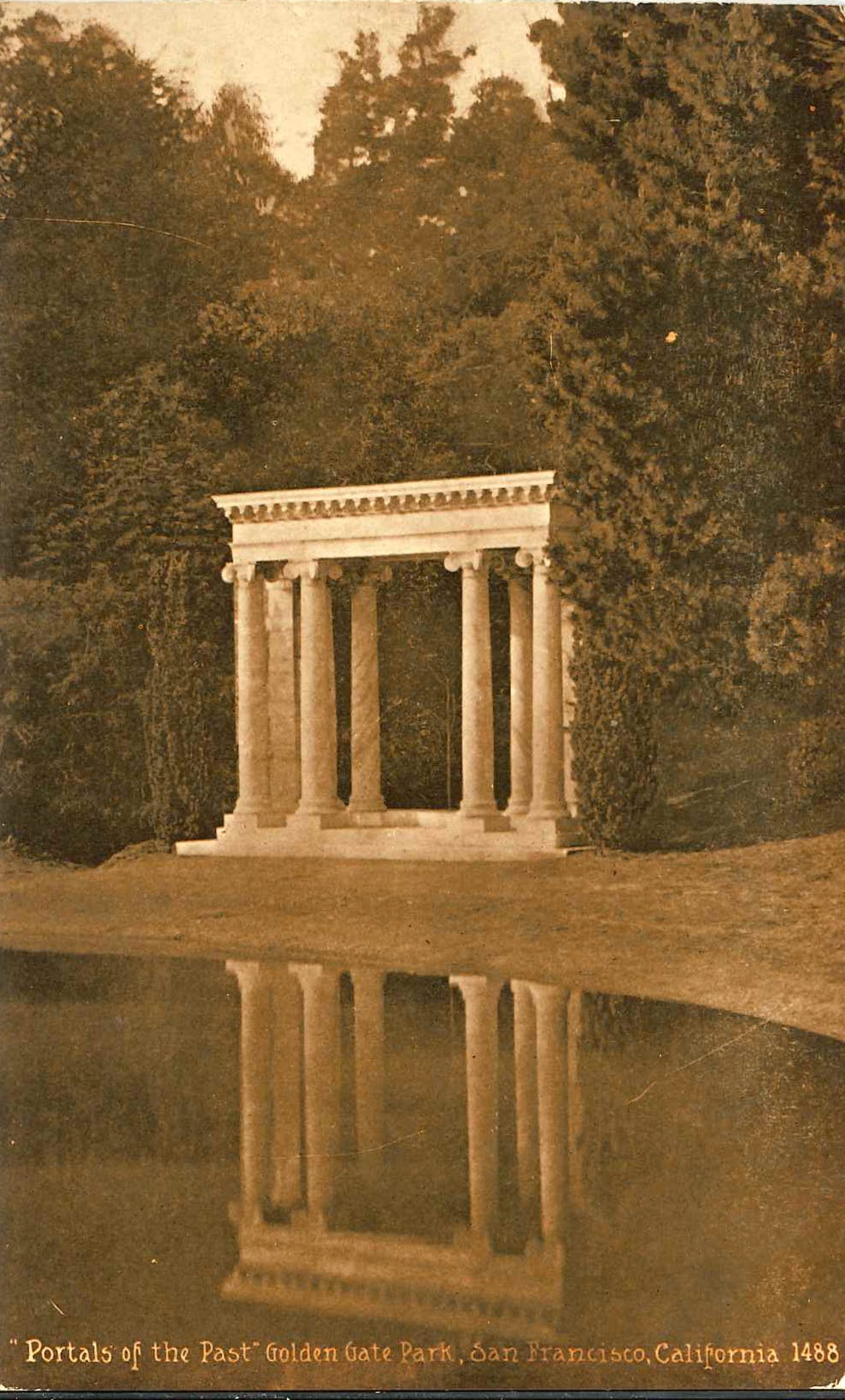In many ways, this is a follow-up to the below-linked article about the picture postcard collection and its creator, Erich Sonntag:
Today, I have a few lines for you.
These were written in 1960 when Erich Sonntag applied for a position with the Austrian Federal Army, the Bundesheer. Below, I am reproducing the following items:
First, facsimile photographs of his curriculum vitae written in summer 1960. These images—and the photograph of him in the uniform of the Bundesheer—were found in his personnel file preserved by the Austrian State Archive in Vienna.
Second, I am providing you with a German transcript and my English translation.
Third, I have elected to write a few “bottom lines” to offer you some of my thoughts.
Finally, my thanks go to my parents who obtained these archival sources and a few other documents earlier this year on my behalf.
German Transcript (for English, scroll down)
Lebenslauf, Wien, 9. August 1960
Ich bin am 15. Mai 1922 in Wien III, Erdbergerlände 10 als Sohn des Bankbeamten Alois Sonntag und seiner Gattin Karoline geboren. Im Jahr 1929 trennten sich meine Eltern. Ich habe 4 Klassen Volksschule und 7 Klassen Realgymnasium besucht. Die letzte Volksschulkasse und die Mittelschule absolvierte ich in der Neulandschule in Wien-Döbling als Internatszögling. Nach der Übernahme dieser Schule durch den Staat entzog man mir als kath. Jugendführer den bisher inngehabten Vollfreiplatz und ich mußte die Anstalt verlassen.
Anfang 1941 wurde ich zum RAD, Dezember des gleichen Jahres zur Wehrmacht einberufen. Von Herbst 1942 bis Ende 1944 war ich in Rußland eingesetzt und wurde kurz vor Kriegsende nach dem Besuch der Waffenschule Rokytzan Leutnant der Res. Am 5. Mai 1945 geriet ich in amerikanische Gefangenschaft aus der ich aber schon nach drei Wochen entlassen wurde.
Völlig mittellos war ich nun kurz Sicherheitswachebeamter und erwarb nebenher durch Ergänzungsprüfungen die Berechtigung zum Hochschulstudium. Hierauf arbeitete ich im Autobusunternehmen meines Stiefvaters, der Hauptmann a.D. Franz Brosch und studierte außerdem Philosophie an der Wiener Universität. Im Sommer 1947 heiratete ich. [Seitenumbruch/page break]
Nach dem Zusammenbruch des väterlichen Unternehmens mußte ich, um die Lebensgrundlage meiner Familie sicherzustellen, die erstbeste Arbeitsmöglichkeit erfassen. So war ich bis nun als Lagerhalter, Erzieher und Religionslehrer an einer Hauptschule tätig.
Ich habe drei Kinder (geboren [redacted]). Ich bin gesund, nicht vorbestraft und schuldenfrei.
English CV
Curriculum vitae, Vienna, 9 August 1960
I was born on 15 May 1922 in Vienna’s third district, Erdbergerlände 10, the son of bank clerk Alois Sonntag and his wife Karoline. My parents separated in 1929. I attended 4 classes of primary school and 7 classes of secondary school. I completed the last year of primary school and secondary school as a boarder at the Neulandschule in Vienna-Döbling. After the school was taken over by the state [in 1938], I, as a Catholic youth leader, was deprived of the full board I had previously held, and I had to leave the institution.
At the beginning of 1941 I was conscripted to the RAD [Reichsarbeitsdienst, the compulsory Labour Service], and, in December of the same year, to the Wehrmacht. From autumn 1942 through the end of 1944, I was deployed in Russia and shortly before the end of the war, after attending the Rokytzan Weapons School [an artillery school in present-day Rokycany, Czechia], I became a lieutenant of the res[erve]. On 5 May 1945, I was taken prisoner by the Americans, from which I was released after just three weeks.
Completely penniless, I was now briefly a security guard and acquired the authorisation to study at university through supplementary examinations. I then worked in my stepfather’s bus company, the retired captain Franz Brosch, and I also studied philosophy at Vienna University. I got married in the summer of 1947. [page break]
After the bankruptcy of my father’s business, I had to take the first job I could to secure my family’s livelihood. I worked as a storage worker, tutor [Erzieher], and religious education teacher at a secondary school.
I have three children (born in [redacted]). I am healthy, have no criminal record, and no debts.
Erich Sonntag
A Few More Lines About the Collector
The below picture was found among Erich Sonntag’s personnel files in the Austrian State Archive. I don’t know when it was taken, but his rank was Oberleutnant (which corresponds to First Lt. in the US Army), which is awarded after 5-6 years, according to Wikipedia.
In Erich Sonntag’s case, however, as his personnel files also reveal, he joined the Bundesheer as a Oberleutnant (contingent, or Vertragsbediensteter) on 1 July 1961 and was promoted to Oberleutnant as of 1 Dec. 1961. The explanation given is straightforward: Erich Sonntag had been promoted to Lieutenant (in the Wehrmacht), and he was able to get his prior service time, combat experience, and then-current service amended. The paperwork was done and approved by late August 1962.
Based on the above information, gleaned from his personnel files—which also indicate his further promotion to Captain, of Hauptmann, as of 1 Jan. 1963—the above picture of him as Oberleutnant must have been taken in late 1962.
Bottom Lines
The strangest thing about this picture is that photographs of both my uncle (who, sadly, passed in 2021) and my cousin look almost like carbon copies of Erich Sonntag.
Moreover, he was about my age when the picture was taken, but unlike me, he was thrown into the meat grinder that was the Eastern Front (“service in Russia”) for more than two years.
From his personal records, I actually know that he was in the Courland Pocket and, if his files are to be believed, he was “evacuated” across the Baltic on the night of 31 Dec. 1944/1 Jan. 1945. If family lore is to be believed, he never went into any body of water after the Second World War.
This wouldn’t be the Erich Sonntag Postcard Collection without, well, at least one picture postcard. I shall post one of my personal favourites, which shows the “Portals of the Past” in San Francisco’s Golden Gate Park:
I like the composition of this vintage postcard, most likely produced before the Great Earthquake of 1906 (for the Erich Sonntag Postcard Collection contains a few more quite similar specimen that can be dated, but that’s a story for a different day), because…well, it’s a beautiful image.
Also, I’m a historian, and to me it indicates the tenuous nature of the present (the portal), which connects, however strangely, the current moment to the past and the future (either sides of the portal).
Diving into my grandfather’s life is one of these strange things, which I’ve never imaged doing before I obtained the postcards, and one the one hand, I’m unsure what I’ll fine—but at the same time I’m very much intrigued by it.
“More” will be written about Erich Sonntag before too long.
For now, I hope you enjoyed this trip through the “Portals of the Past”.








I think it’s wonderful that you’re getting to know your grandfather in this way
Pls see Louis Begley's "why the dreyfus affair matters" Yale Univ Press, 2009. I answered my own puzzlement but the historical truth is important for Austria's honor - pls excuse my sentimentality.
from pages 48-50
"Along with other European powers, France had been surprised by Prussia's decisive victory on July 3, 1866, over the Austrian army at the battle of Königgrätz... which had forced Austria to sue for peace. The two countries had been at war over Austria's refusal to give up the controlling influence it exercised in Germany through the German Confederation, a political system established in 1815 by the Congress of Vienna. . . the peace treaty of Prague... abolished the confederation.... Prussia absorbed some of the confederation's north German member states and forced others to enter into a north German confederation, which put Prussia in full charge... Overnight... Prussia had vaulted from second-tier power status into the first rank.... The industrial potential of the new Prussia likewise threatened France's dominance on the continent"
Ironically the treaty that ended the Franco-Prussian War with Germany victorious, was signed at Versailles.
Begley describes corruption in the French army, Catholic Church/State ties of the post Franco-Prussian War generation that defies the imagination. Begley presents this as background to the false accusations and framing of the French patriot, Captain Alfred Dreyfus.
The Franco-Prussian War matters in viewing the rise of Prussian Germany, the demise of the Austro-Hungarian Empire and Austria having had no option but to succumb to the brutal Anschluss. The Dreyfus Affair matters more today than ever, however as a focal point of anti-Semitic hatred that rises up like an influenza, a pandemic whenever it can break passes normalcy and sanity to a narrow-minded, fear-driven ignorant public.